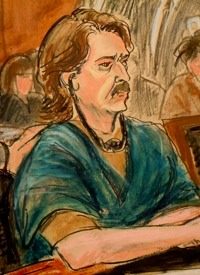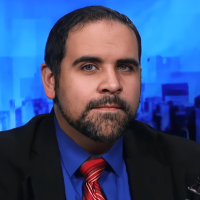
Though Bout has been indicted by the Justice Department on several charges — conspiracy to kill U.S. nationals, conspiracy to kill U.S. officers, conspiracy to acquire and use an anti-aircraft missile, and conspiracy to provide aid and arms to terrorists — he maintains his innocence, alleging that the U.S. government has fabricated lies against him.
Showing no emotion, Bout remained silent throughout the hearing as Federal Judge Shira Scheindlin announced the trial date for September 12, 2011 — one day after the 10th anniversary of the 9/11 terrorist attacks. If convicted of the charges against him, Bout faces anywhere from 25 years to life in prison.
The case may prove difficult for prosecutors, as Bout is refusing to cooperate or divulge any information to U.S. authorities.
Because Bout is a former Soviet air force officer with ties to the GRU (Russian military intelligence) and connections to the highest echelons of the Russian government, his arrest and exposure places a powerful spotlight on Russia’s sponsorship of an international terrorist network alleged to include the Lebanese-based Palestinian insurgent Hezbollah, the Somali-based Islamist terror militia Harakat al-Shabaab al-Mujahideen, and the Marxist narco-terrorist FARC in Columbia.
In fact, during the sting operation in which Bout was captured by DEA agents posing as FARC officials, Bout explained to them that he sold arms “all within the context of speaking about a shared ideology of communism.”
The magnitude of Bout’s communist self-admission and remarks reveals that Russia never truly shed itself of communism — but remains the driving ideological force behind the delivery of arms around the world to anti-American terrorist groups.
Already some speculation has circulated that the United States may seek to strike a deal with Russia, hoping to swap Bout for Mikhail Khodorkovsky, the Russian former oil tycoon billionaire recently found guilty in a Russian court of embezzling over $25 billion in oil. Such a swap would be reminiscent of the U.S. deportation of the 10 Russian spies, apprehended by the FBI this past summer. However, the information that Bout possesses is seen by most as much too valuable for any bargaining.
On January 13, Russian Foreign Minister Sergei Lavrov claimed, “Nobody is discussing any swap deals concerning Viktor Bout.” The statement was made at the annual summary news conference, according to Russian state media RIA Novosti.
A “well-place source in Moscow,” who “previously held a senior government position himself,” told the BBC that Bout “had very close relations with some people in the president’s office in both Yeltsin’s and Putin’s time.”
But because Viktor Bout is perhaps the smoking-gun proof that Russia covertly operates an international terrorist network, this would of course explain why his defense counsel is not making this case any easier for U.S. officials. Sabrina Shroff, his court-appointed attorney, challenged the validity of trying Bout for crimes that occurred outside of the United States. “It’s a manufactured jurisdiction,” she told Judge Scheindlin.
Bout’s defense also maintains that the United States illegally seized and brought him out of Thailand. Alexander Otchaynov, Vice-Consul of the Russian Consulate in New York, told RT News in a televised interview, “According to Bout’s Thai and Russian lawyers, his case to this moment remains in a Thai court being there was no official decision of an extradition.”
Otchaynov revealed Russia’s continued support of Bout, telling the Russian news agency Itar-Tass: “The Consulate-General’s staff intends to continue to monitor the situation and provide assistance to both the accused and the relatives of Viktor Bout, who are now in New York.” The primary assistance is “in the selection of paid lawyers,” of which “some candidates have already been offered to Viktor Bout, and he is considering them,” Otchaynov added.
This case could complicate and even antagonize U.S. relations with Russia, as it is expected to drag on for months into 2012, when both countries face presidential elections. Nevertheless many observers believe that failure to pursue the trial of Bout would be folly, particularly in light of his ties to both the Kremlin oligarchs and an array of terrorists of Marxist and Islamist persuasions.
Courtroom sketch of Viktor Bout: AP Images
Related Articles:




